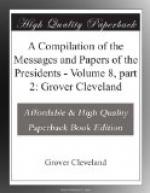With Prussia, Spain, Portugal, and, in general, all the European powers between whom and the United States relations of friendly intercourse have existed their condition has not materially varied since the last session of Congress. I regret not to be able to say the same of our commercial intercourse with the colonial possessions of Great Britain in America. Negotiations of the highest importance to our common interests have been for several years in discussion between the two Governments, and on the part of the United States have been invariably pursued in the spirit of candor and conciliation. Interests of great magnitude and delicacy had been adjusted by the conventions of 1815 and 1818, while that of 1822, mediated by the late Emperor Alexander, had promised a satisfactory compromise of claims which the Government of the United States, in justice to the rights of a numerous class of their citizens, was bound to sustain. But with regard to the commercial intercourse between the United States and the British colonies in America, it has been hitherto found impracticable to bring the parties to an understanding satisfactory to both. The relative geographical position and the respective products of nature cultivated by human industry had constituted the elements of a commercial intercourse between the United States and British America, insular and continental, important to the inhabitants of both countries; but it had been interdicted by Great Britain upon a principle heretofore practiced upon by the colonizing nations of Europe, of holding the trade of their colonies each in exclusive monopoly to herself. After the termination of the late war this interdiction had been revived, and the British Government declined including this portion of our intercourse with her possessions in the negotiation of the convention of 1815. The trade was then carried on exclusively in British vessels till the act of Congress, concerning navigation, of 1818 and the supplemental act of 1820 met the interdict by a corresponding measure on the part of the United States. These measures, not of retaliation, but of necessary self-defense, were soon succeeded by an act of Parliament opening certain colonial ports to the vessels of the United States coming directly from them, and to the importation from them of certain articles of our produce burdened with heavy duties, and excluding some of the most valuable articles of our exports. The United States opened their ports to British vessels from the colonies upon terms as exactly corresponding with those of the act of Parliament as in the relative position of the parties could be made, and a negotiation was commenced by mutual consent, with the hope on our part that a reciprocal spirit of accommodation and a common sentiment of the importance of the trade to the interests of the inhabitants of the two countries between whom it must be carried on would ultimately bring the parties to a compromise with which both might be satisfied. With this view the Government




